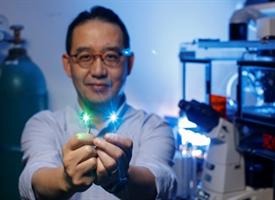
The science behind harnessing the immune system to fight cancer is complicated, but a University of Rochester Medical Center laboratory discovered a simple, practical way to use light and optics to steer killer immune cells toward tumors.
In a study published by the online journal Nature Communications, lead author Minsoo Kim, Ph.D., a UR professor of Microbiology and Immunology and a Wilmot Cancer Institute investigator, described his method as similar to "sending light on a spy mission to track down cancer cells."
Immunotherapy is different from radiation or chemotherapy. Instead of directly killing cancer cells, immunotherapy tells the immune system to act in certain ways by stimulating T cells to attack the disease. Several different types of immunotherapy exist or are in development, including pills called "checkpoint inhibitors" and CAR T-cell therapy that involves removing a patient's own immune cells and altering them genetically to seek and destroy cancer cells.
The problem, however, is that immunotherapy can cause the immune system to overreact or under-react, Kim said. In addition, cancer cells are evasive and can hide from killer T-cells. Aggressive tumors also suppress the immune system in the areas surrounding the malignancy (called the microenvironment), keeping T cells out.